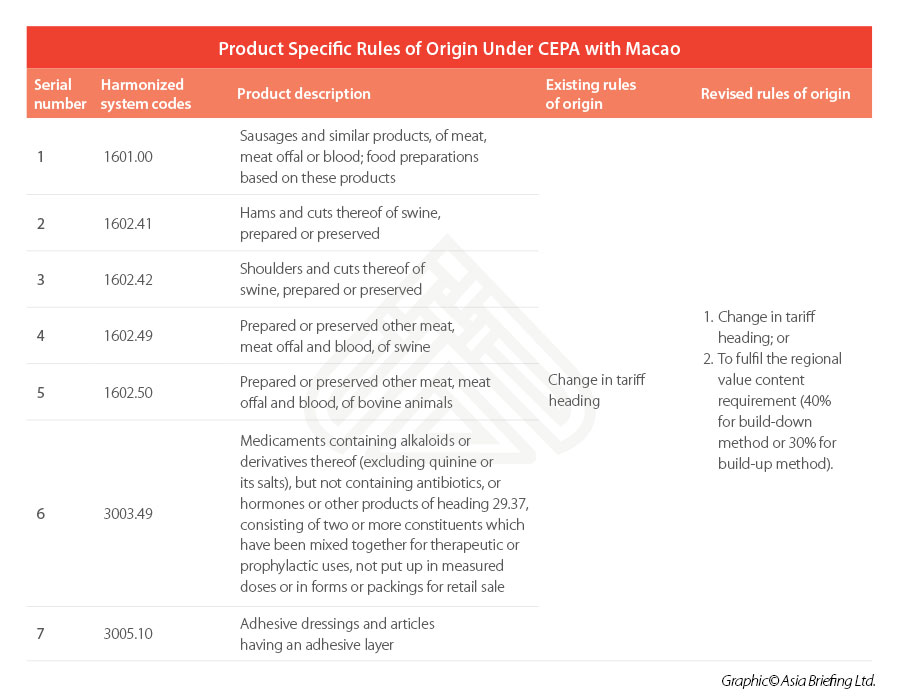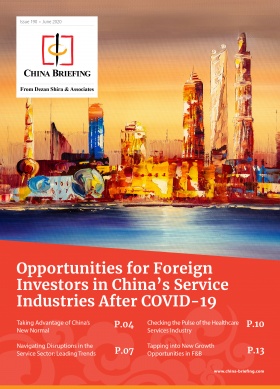China Revises Rules of Origin for Some Goods Under CEPA, Effective July 1
On June 18, the General Administration of Customs (GAC) released the Announcement about Revising Rule of Origin for Some Goods Entitled to Zero Tariff under the Closer Economic Partnership Arrangement (CEPA) with Hong Kong and Macao (GAC Announcement [2020] No.76).
New rules of origin for some products under the CEPAs with Hong Kong and Macao will be implemented on July 1, 2020.
The affected products include one textile material of Hong Kong origin as well as five foodstuffs and two pharmaceutical products of Macao origin.
The details of the changes are shown in the following tables.
How do the new rules apply?
According to the new rules, on top of the corresponding change in tariff heading, the good can also be deemed as of Hong Kong or Macao origin as long as its regional value content (RVC) is greater than or equal to 30 percent when calculated by the build-up method, or greater than or equal to 40 percent when calculated by the build-down method (“General Rule”).
This means that products that have not previously met the product specific rules of origin may also enter the Mainland China with zero tariff as long as they comply with the new rule.
What is CEPA and CEPA Rule of Origin?
The Mainland-Hong Kong Closer Economic Partnership Arrangement (CEPA) and the Mainland-Macao CEPA are two free trade agreements (FTA) aimed at enhancing economic and trade cooperation between Mainland China and the two autonomous regions.
Hong Kong and Macao concluded the main text of the CEPAs with Beijing in June 2003 and October 2003, respectively. The two CEPAs became effective on January 1, 2004. In the years that followed, a number of supplements to the CEPAs were also signed.
Under the CEPAs, starting January 1, 2006, all goods of Hong Kong or Macao origin, except for those prohibited, can enjoy zero-tariff preference upon importation into the Mainland, as long as the CEPA rules of origin is met and each consignment of goods is accompanied by a Certificate of Origin.
On December 14, 2018, Beijing signed the Agreements on Trade in Goods under the framework of CEPAs with Hong Kong and with Macao. Both Agreements on Trade in Goods came into effect on January 1, 2019.
The Agreements on Trade in Goods integrated the relevant provisions in the CEPAs and its supplements and established the criterion of origin and more flexible methods for determining the origin for all Hong Kong and Macao products classified under the Mainland’s tariff codes (see Hong Kong’s full ‘List of Product Specific Rules of Origin’ and Macao’s full List under their Agreements on Trade in Goods).
Applying for the Certificate of Origin
To be noted, to claim the zero-tariff preference on goods imported into Mainland China, enterprises will have to apply for a Certificate of Origin (CO) under CEPA from Hong Kong or Macao for each consignment of goods.
For example, Macao manufacturers are required to submit information on their production facilities and other details of the products concerned to the CO Issuance Division of Macao Economic Services. After verification of the said information, the applicants may then submit to the properly completed CO Application Form, CO of CEPA, and the original related commercial invoice to the Macao Economic Bureau. After final assessment by the Macao Economic Bureau, the CO’s data will then be transmitted electronically to the Customs’ system of the Mainland. The applicant only needs to give the number of the relevant CO to importer, so the importer can submit the import declaration with the Mainland’s Customs.
For details of the requirements for the Hong Kong CO (CEPA) application procedures, enterprises can refer to the Certificate of Origin Circular No. 5/2018 released by the Trade and Industry Department of Hong Kong SAR government. Hong Kong manufacturers need to be registered with the Trade and Industry Department under Factory Registration in advance to be eligible to apply the certificates.
About Us
China Briefing is written and produced by Dezan Shira & Associates. The practice assists foreign investors into China and has done so since 1992 through offices in Beijing, Tianjin, Dalian, Qingdao, Shanghai, Hangzhou, Ningbo, Suzhou, Guangzhou, Dongguan, Zhongshan, Shenzhen, and Hong Kong. Please contact the firm for assistance in China at china@dezshira.com.
We also maintain offices assisting foreign investors in Vietnam, Indonesia, Singapore, The Philippines, Malaysia, Thailand, United States, and Italy, in addition to our practices in India and Russia and our trade research facilities along the Belt & Road Initiative.
- Previous Article Contingencias de Covid-19: Asistencia para Cambiar la Cadena de Montaje de China a Vietnam
- Next Article An Introduction to China’s Cross-Border E-Commerce Pilot Zones and Pilot Cities










